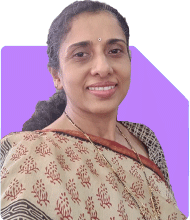Is Big Data a Lucrative Career Choice for a BCA Graduate?
Nayagam P P |10899 Answers |Ask -Follow
Career Counsellor - Answered on Feb 28, 2025
He started his career as an HR professional and has over 10 years of experience in tutoring and mentoring students from Classes 8 to 12, helping them choose the right stream, course and college/university.
He also counsels students on how to prepare for entrance exams for getting admission into reputed universities /colleges for their graduate/postgraduate courses.
He has guided both fresh graduates and experienced professionals on how to write a resume, how to prepare for job interviews and how to negotiate their salary when joining a new job.
Nayagam has published an eBook, Professional Resume Writing Without Googling.
He has a postgraduate degree in human resources from Bhartiya Vidya Bhavan, Delhi, a postgraduate diploma in labour law from Madras University, a postgraduate diploma in school counselling from Symbiosis, Pune, and a certification in child psychology from Counsel India.
He has also completed his master’s degree in career counselling from ICCC-Mindler and Counsel, India.
... more

What is the job opportunity for BCA in Big Data Analytics
Career Opportunities:
Data Analyst: Interpret complex data to help organizations make informed decisions.
Business Intelligence Analyst: Analyze data to produce financial and market intelligence reports.
Data Scientist: Develop algorithms and models to extract insights from data.
Data Engineer: Design and manage systems for collecting, storing, and analyzing data.
Machine Learning Engineer: Create systems that enable machines to learn and make decisions from data.
Industries Hiring Big Data Professionals:
Information Technology (IT): Companies like TCS, Infosys, and Wipro recruit data professionals for roles in customer analytics, marketing analytics, and fraud detection.
Financial Services: Banks and insurance firms utilize data analytics for risk assessment, fraud detection, and customer segmentation.
E-commerce: Online retailers analyze customer behavior and optimize inventory through data insights.
Healthcare: Medical organizations leverage data to enhance patient care and operational efficiency.
Enhancing Employability:
To improve your prospects in Big Data Analytics:
Advanced Education: Consider certifications or postgraduate studies in data science or related fields.
Skill Development: Gain proficiency in programming languages like Python and R, and familiarize yourself with data visualization tools such as Tableau or Power BI.
Practical Experience: Engage in internships, projects, or freelance work to build a robust portfolio.
By focusing on these areas, you can position yourself competitively in the Big Data Analytics job market. All the Best for your Prosperous Future.
Follow RediffGURUS to Know more on 'Careers | Health | Money | Relationships'.
You may like to see similar questions and answers below
Patrick Dsouza |1441 Answers |Ask -Follow
CAT, XAT, CMAT, CET Expert - Answered on Apr 15, 2024
Radheshyam Zanwar |6792 Answers |Ask -Follow
MHT-CET, IIT-JEE, NEET-UG Expert - Answered on Jul 11, 2025
Patrick Dsouza |1441 Answers |Ask -Follow
CAT, XAT, CMAT, CET Expert - Answered on Aug 18, 2025
Dr Deepa Suvarna |176 Answers |Ask -Follow
Paediatrician - Answered on Jan 31, 2026
Dr Deepa Suvarna |176 Answers |Ask -Follow
Paediatrician - Answered on Jan 31, 2026
Dr Deepa Suvarna |176 Answers |Ask -Follow
Paediatrician - Answered on Jan 31, 2026
Dr Deepa Suvarna |176 Answers |Ask -Follow
Paediatrician - Answered on Jan 31, 2026
Dr Deepa Suvarna |176 Answers |Ask -Follow
Paediatrician - Answered on Jan 31, 2026
Reetika Sharma |518 Answers |Ask -Follow
Financial Planner, MF and Insurance Expert - Answered on Jan 31, 2026
Reetika Sharma |518 Answers |Ask -Follow
Financial Planner, MF and Insurance Expert - Answered on Jan 31, 2026
Reetika Sharma |518 Answers |Ask -Follow
Financial Planner, MF and Insurance Expert - Answered on Jan 31, 2026
Radheshyam Zanwar |6792 Answers |Ask -Follow
MHT-CET, IIT-JEE, NEET-UG Expert - Answered on Jan 31, 2026
Ramalingam Kalirajan |11000 Answers |Ask -Follow
Mutual Funds, Financial Planning Expert - Answered on Jan 30, 2026




















.jpg)




